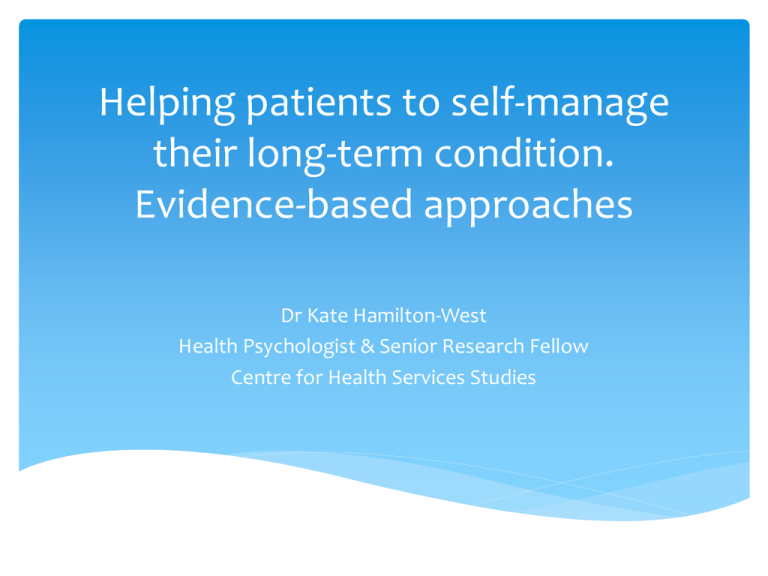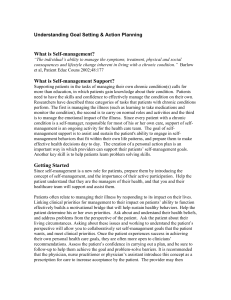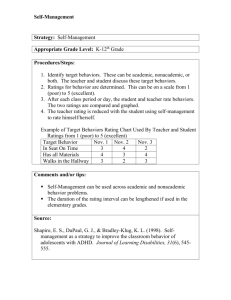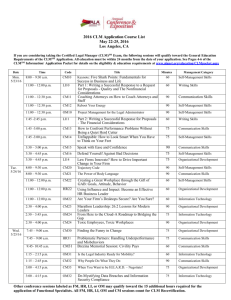Helping patients to self-manage their long-term
advertisement

Helping patients to self-manage their long-term condition. Evidence-based approaches Dr Kate Hamilton-West Health Psychologist & Senior Research Fellow Centre for Health Services Studies Aims The challenge of chronic illness What do we mean by self-management? How is self-management studied? How can research inform the development of interventions and strategies to help people selfmanage their LTC? Examples of evidence-based approaches The Challenge of Chronic Illness Long term conditions (LTCs) or chronic diseases are those that can be managed but often not cured (e.g. diabetes, arthritis, asthma, a number of cardiovascular diseases, HIV/AIDS and certain cancers) Around 15 million people in England – around 30% of the population - have one or more LTC and this figure is predicted to rise. Multi-morbidity is also becoming increasingly prevalent, with the number of people living with three or more LTCs predicted to reach 2.9 million in 2018 (Department of Health, 2012). The Challenge of Chronic Illness Recent reports (e.g. Kings Fund, NHS Confederation, Coalition for Collaborative Care) highlight that major changes will be needed for the NHS to respond effectively to the increasing numbers of people living with LTCs. This will include changes to the way services are organised and delivered and a greater emphasis on evidence-based interventions/strategies to help people manage their LTC. What do we Mean by Self-Management? No universally agreed definition. Definitions overlap with related concepts (e.g. coping, adaptation) In general terms self-management refers to ‘the things people do to help themselves live with a long term condition’ (Self-management UK) One cannot not self-manage – anything a person with a LTC does/ doesn’t do reflects their approach to selfmanagement (Lorig & Holman, 2003) Approaches to Studying SelfManagement Two main approaches: 1. Qualitative research – focusing on patients’ experiences of living with and managing LTCs 2. Health psychology research – developing models and theories that can be used to: • • explain individual variability (in cognition, emotion and behaviour) among people with the same condition develop theory-based interventions/ strategies. Qualitative Research Qualitative research can provide a rich insight into patients’ experiences and the reasons why selfmanagement can be challenging, e.g. Darren describes his experiences with diabetes: http://www.healthtalk.org/content/darren-gets-downalways-needing-follow-diet-and-take-medication-heworks-hard-making For more video interviews see: www.healthtalk.org Qualitative Research Qualitative research has identified sets of selfmanagement tasks, e.g. Corbin & Strauss, (1988) Medical management (e.g. Taking medication, attending appointments) Behavioural management (e.g. adapting lifestyle and roles) Emotional management (e.g. managing anger, frustration, fear for the future) Qualitative research Qualitative research also helps to understand ‘non selfmanagement’ E.g. Hinder and Greenhalgh (2012) found that self-management of diabetes was complex and involved a wide range of tasks ‘non self-management' tended to occur in contexts where people's material, intellectual or emotional resources were stretched (e.g. due to poverty, low health literacy, a demanding family or social context, or multiple co-morbidity) Findings warn against a narrow focus on the individual’s knowledge, attitudes and behaviour Suggest the need for a much broader approach, including training health professionals to ‘recognise, value and effectively support the efforts of the self-managing patient.’ Health Psychology Research Health Psychology is an applied branch of psychology concerned understanding and improving health and the healthcare system. Numerous models and theories relevant to understanding individual differences in cognitive, emotional and behavioural responses to illness. These can be used to develop theory-based interventions and strategies and to train health professionals to support self-managing patients. The Health Belief Model One of the earliest models of health behaviour change People will take preventive health action (e.g. taking medication, quitting smoking) if they believe that: they are susceptive to a disease, the disease is serious, the benefits of taking action outweigh the barriers People can be cued to take action (e.g. by media campaigns, advice from GP, family member) The Health Belief Model Advantages Emphasises the role of individual beliefs (which may differ from those of the health professional) Recognises that behaviour change has advantages and disadvantages Disadvantages If decision making is this rational, why do people drink, smoke, overeat etc? No role for emotion Focused on individual’s beliefs Theory of Planned Behaviour Behaviour is predicted by intention, which is predicted by 3 types of belief Beliefs about the behaviour (e.g. ‘I think quitting smoking is a good thing to do’) Perceptions of others’ beliefs (e.g. ‘my friends and family think I should quit smoking’) Perceived control over the behaviour (e.g. ‘I believe I can quit if I want to’) Beliefs are weighted by the power of each outcome/attribute: http://people.umass.edu/aizen/tpb.h tml Theory of Planned Behaviour Advantages Recognises social influences on health behaviour (e.g. ‘peer pressure’) Perceived control is recognised to be important and most models of health behaviour include related constructs Disadvantages Model predicts intention, but intention is often a poor predictor of behaviour change (e.g. smoking cessation, dieting) Still v rational and focused on individual’s beliefs, no role for emotions Self Efficacy Theory People are more likely to carry out an action and persist with it in the face of difficulties if they are high in ‘self-efficacy’ Self-efficacy refers to the individual’s belief in their ability to carry out particular actions under particular conditions e.g. a person might feel confident about eating healthily at home, but not when eating out/ on holiday / tired / run down Self-efficacy is relevant at all stages from initiating an action, to maintaining behaviour and recovering from relapse Self Efficacy Theory Advantages Describes how to enhance selfefficacy – important for developing interventions Emphasises interaction between individual and environment Recognises that behaviour change is a process, not a single action Disadvantages Efficacy beliefs are important, but what about other illness beliefs? The Common Sense Model of Self Regulation People monitor their bodily symptoms and interpret changes to their health along certain key dimensions: The Identity of the illness/problem Its timeline Its likely cause and Consequences and controllability (personal control and treatment control) These illness representations influence the way the person copes Coping is also influenced by emotional reactions The Common Sense Model of Self Regulation Advantages Specifically developed to explain variation in response to illness Includes cognitive and emotional factors Recognises the importance of self-monitoring Illness perceptions can be easily assessed and there are several condition-specific measures available: http://www.uib.no/ipq/ Disadvantages Focused on individual Does not tell us how to change illness perceptions (but can be combined with approaches, e.g. CBT, MI) Evidence-based approaches Since self-management is multifaceted there is no universal approach for supporting/ enhancing selfmanagement However, there are evidence based approaches to: Enhance self-efficacy/confidence to self-manage Enhance motivation to self-manage Address inaccurate health beliefs/ illness perceptions How to Develop Self-Efficacy Lay led programmes, e.g. Stanford Chronic Disease Self-management programme NHS Expert Patients Programme Sig improvements in self-efficacy, but no change in psychological wellbeing or health care use (Foster et al. 2009) Train the trainer programmes, e.g. UKC PostCarD (postural care for children with disabilities) Training delivered by OT/ physiotherapists Sig improvements in knowledge, understanding and confidence (self-efficacy) http://www.kent.ac.uk/chss/research/docs/2011/2011_09_01_post ual_care.html How to Enhance Motivation Motivational interviewing involves eliciting the patient’s own motivation for change and helping them to identify and overcome barriers (Miller & Rollnick, 1991) Developed for treatment of addictions Also effective for improving diabetes self-care and HbA1c (Song et al., 2014) How to Change Illness Perceptions Concordance therapy (CcT) uses techniques from MI and CBT to address illness perceptions preventing active selfmanagement We have used this approach to: improve blood glucose and psychological outcomes in older people with type 2 diabetes (Hamilton-West et al., 2010; 2013) train mental health workers to support diabetes selfmanagement (Hamilton-West et al., 2014) Conclusions 1. Living with a long term condition is difficult Even patients who appear to be ‘inactive’ or ‘non-adherent’ are likely to be engaged in efforts to manage their condition Failed attempts to self-manage (including attempts to gain support when needed) increase the risk of frustration, anger and disengagement It is vital that patients’ self-management efforts are recognised and supported Conclusions 2. Information alone is not enough – patients need to feel confident and appropriately supported Self-efficacy can be enhanced via self-management programmes and/or local patient support groups and by providing opportunities for ‘mastery experiences’ Important to acknowledge past difficulties empathically and provide verbal encouragement/reassurance Support needs change over time – ‘one off’ information/support is unlikely to meet all future needs Conclusions 3. Emotional reactions to illness and inaccurate illness representations can act as barriers to self-management Important to explore individual’s beliefs about their condition and the role of self-management Psychological needs should also be assessed Some patients will require referral to psychological therapy services ‘Sub-threshold needs’ (e.g. difficulties with stress and coping) can also impact self-management Conclusions 4. Helping people to self-manage requires a collaborative approach “It is vital that the conversation that clinicians have with people changes from ‘What is the matter?’ to ‘What matters to you?’”(NHS Confederation, 2014) Knowledge and skills relevant to supporting selfmanagement will become increasingly important. References Corbin J.M. & Strauss A. (1988). Unending work and care: Managing chronic illness at home. Jossey-Bass; San Francisco, CA. Department of Health (2012). Long-term conditions compendium of Information: 3rd edition. Department of Health. Foster, G., Taylor, S. J. C., Eldridge, S., Ramsay, J., Griffiths, C. J. (2009). Self-management education programmes by lay leaders for people with chronic conditions (review). The Cochrane Library. Hamilton-West, K.E. and Katona, C. and King, A. and Rowe, J and Coulton, S. and Milne, A.J. and Alaszewski, A.M. and Pinnock, H (2010) Improving Concordance in Older People with Type 2 Diabetes (ICOPE-D). Final Report to the National Institute for Health Research. Annex A. Concordance Therapy Manual [PB-PG-0906-10182]. Available at: http://kar.kent.ac.uk/34279 Hamilton-West, K.E., Rowe, J.A., Katona, C., King, A.M., Coulton, A., Milne, A.J., Alaszewski, A., Ellis, K. & Pinnock, H. (2013). A concordance therapy to help older people self-manage type 2 diabetes. Diabetes & Primary Care 15: 240–8 Hamilton-West, K.E., Smith, K., Grice, K., Smith, J., Vaughan, A., Kolubinski, D. & Kanellakis, P. (2014). development of a primary care diabetes psychology service. Diabetes & Primary Care, 16, 129-36. Hinder, S., & Greenhalgh, T. (2012). ‘This does my head in.’ Ethnographic study of self-management by people with diabetes. BMC Health Services Research, 12, 1, 83. Lorig, K.R. & Holman, H.R. (2003). Self-management education: History, definition, outcomes, and mechanisms. Annals of Behavioral Medicine, 26, 1-7. Miller, W. R. and Rollnick, S. (1991) Motivational interviewing: Preparing people to change addictive behavior. New York: Guilford Press NHS Confederation, 2014. Not more of the same. NHS Confederation. Song, D., Xu, Tu-Zhen & Sun, Qiu-Hua (2014). Effect of motivational interviewing on self-management in patients with type 2 diabetes mellitus: A meta-analysis. International Journal of Nursing Sciences, 1, 291–297.





